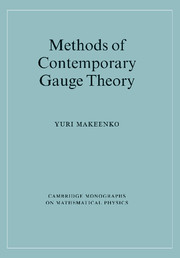12 - QCD in loop space
Published online by Cambridge University Press: 02 December 2009
Summary
QCD can be entirely reformulated in terms of the colorless composite field Φ(C) – the trace of the Wilson loop for closed contours. This fact involves two main steps:
all of the observables are expressed via Φ(C);
the dynamics is entirely reformulated in terms of Φ(C).
This approach is especially useful in the large-N limit where everything is expressed via the vacuum expectation value of Φ(C) – the Wilson loop average. Observables are given by summing the Wilson loop average over paths with the same weight as in free theory. The Wilson loop average itself obeys a close functional equation – the loop equation.
We begin this chapter by presenting the formulas which relate observables to Wilson loops. Then we translate the quantum equation of motion of Yang–Mills theory into loop space. We derive the closed equation for the Wilson loop average as N → ∞ and discuss its various properties, including a nonperturbative regularization. Finally, we briefly comment on what is known concerning solutions of the loop equation.
Observables in terms of Wilson loops
All observables in QCD can be expressed via the Wilson loops Φ(C) defined by Eq. (11.115). This property was first advocated by Wilson [Wil74] on a lattice. Calculation of QCD observables can be divided into two steps:
calculation of the Wilson loop averages for arbitrary contours;
summation of the Wilson loop averages over the contours with some weight depending on a given observable.
- Type
- Chapter
- Information
- Methods of Contemporary Gauge Theory , pp. 249 - 286Publisher: Cambridge University PressPrint publication year: 2002



